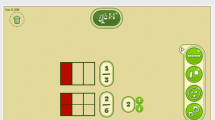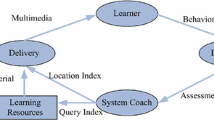Abstract
My PhD focuses on adapting learning activities selection to learner affect in an intelligent tutoring system. The research aims to investigate the affective states considered for adapting learning activity selection, and how to adapt to these. It also seeks to know how learner’s affective state can be obtained through tutor-learner interaction rather than via sensors or questionnaires. The research will use of a mixture of qualitative and quantitative methods to achieve these aims. This research will significantly contribute to the area of intelligent tutoring technology by providing more insights into how to adapt to affective states, and improve the delivery of learning. The result will lead to an algorithm for learning activity selection based on affect, which also incorporates other relevant learner characteristics, such as personalty, that moderate affect.
Access this chapter
Tax calculation will be finalised at checkout
Purchases are for personal use only
Similar content being viewed by others
References
Baker, R.S.J., Rodrigo, M.M.T., Xolocotzin, U.E.: The dynamics of affective transitions in simulation problem-solving environments. In: Paiva, A.C.R., Prada, R., Picard, R.W. (eds.) ACII 2007. LNCS, vol. 4738, pp. 666–677. Springer, Heidelberg (2007). https://doi.org/10.1007/978-3-540-74889-2_58
Cohn, M.A., Fredrickson, B.L., Brown, S.L., Mikels, J.A., Conway, A.M.: Happiness unpacked: positive emotions increase life satisfaction by building resilience. Emotion (Wash. D.C.) 9(3), 361–368 (2009). http://www.ncbi.nlm.nih.gov/pubmed/19485613
Craig, S.D., Graesser, A.C., Sullins, J., Gholson, B.: Affect and learning: an exploratory look into the role of affect in learning with AutoTutor. J. Educ. Media 29(3), 241–250 (2004)
D’Mello, S., Picard, R., Graesser, A.: Towards an affect-sensitive AutoTutor. IEEE Intell. Syst. 22(4), 53–61 (2007)
Drachsler, H., Verbert, K., Santos, O.C., Manouselis, N.: Panorama of recommender systems to support learning. In: Ricci, F., Rokach, L., Shapira, B. (eds.) Recommender Systems Handbook, pp. 421–451. Springer, Boston (2015). https://doi.org/10.1007/978-1-4899-7637-6_12
Forgas, J.P., Eich, E.: Affective influences on cognition mood congruence, mood dependence, and mood effects on processing strategies. In: Weiner, I.B. (ed.) Handbook of Psychology, Chap. 3, pp. 61–82. Wiley, New York (2012)
Goetz, T., Athan, N., Hall, C.: Emotion and Achievement in the Classroom. Routledge, New York (2013)
Graesser, A., D’Mello, S., Chipman, P., King, B., McDaniel, B.: Exploring relationships between affect and learning with AutoTutor. Int. J. Artif. Intell. Educ. 12(1), 257–279 (2001)
Kruglanski, A.W., Forgas, J.P.: Attitudes and attitude change frontier of social psychology. In: Crano, W.D., Prislin, R. (ed.) Frontiers of Social Psycology, Chap. 3. Psychology press Taylor and Francis group (2008)
Lehman, B., Matthews, M., D’Mello, S., Person, N.: What are you feeling? Investigating student affective states during expert human tutoring sessions. In: Woolf, B.P., Aïmeur, E., Nkambou, R., Lajoie, S. (eds.) ITS 2008. LNCS, vol. 5091, pp. 50–59. Springer, Heidelberg (2008). https://doi.org/10.1007/978-3-540-69132-7_10
Manouselis, N., Drachsler, H., Verbert, K., Duval, E.: Recommender Systems for Learning - An Introduction, 1st edn. Springer, New York (2012). https://doi.org/10.1007/978-1-4614-4361-2
Masthoff, J.: The user as wizard: a method for early involvement in the design and evaluation of adaptive systems. In: Fifth Workshop on User-Centred Design and Evaluation of Adaptive Systems, pp. 460–469 (2006)
McDaniel, B., D’Mello, S., King, B., Chipman, P., Tapp, K., Graesser, A., Edu, G.: Facial features for affective state detection in learning environments. In: Proceedings of the Annual Meeting of the Cognitive Science Society, vol. 29 (2007)
Okpo, J., Masthoff, J., Dennis, M., Beacham, N., Ciocarlan, A.: Investigating the impact of personality and cognitive efficiency on the selection of exercises for learners. In: Proceedings of the 25th Conference on User Modeling, Adaptation and Personalization - UMAP 2017, pp. 140–147 (2017)
Pekrun, R., Goetz, T., Titz, W., Perry, R.P.: Academic emotions in students’ self-regulated learning and achievement: a program of qualitative and quantitative research. Educ. Psychol. 37(2), 91–106 (2002)
Picard, R.W.: Affective Computing. MIT Press, Cambridge (2000)
Psotka, J., Massey, L.D.L.D., Mutter, S.A.: Intelligent Tutoring Systems: Lessons Learned. L. Erlbaum Associates, Mahwah (1988)
Tyng, C.M., Amin, H.U., Saad, M.N.M., Malik, A.S.: The influences of emotion on learning and memory. Front. Psychol. 8, 1454 (2017)
Verbert, K., Manouselis, N., Ochoa, X., Wolpers, M., Drachsler, H., Bosnic, I., Duval, E.: Context-aware recommender systems for learning: a survey and future challenges. IEEE Trans. Learn. Technol. 6(1), 318–335 (2007)
Author information
Authors and Affiliations
Corresponding author
Editor information
Editors and Affiliations
Rights and permissions
Copyright information
© 2018 Springer International Publishing AG, part of Springer Nature
About this paper
Cite this paper
Odo, C. (2018). Adapting Learning Activities Selection in an Intelligent Tutoring System to Affect. In: Penstein Rosé, C., et al. Artificial Intelligence in Education. AIED 2018. Lecture Notes in Computer Science(), vol 10948. Springer, Cham. https://doi.org/10.1007/978-3-319-93846-2_98
Download citation
DOI: https://doi.org/10.1007/978-3-319-93846-2_98
Published:
Publisher Name: Springer, Cham
Print ISBN: 978-3-319-93845-5
Online ISBN: 978-3-319-93846-2
eBook Packages: Computer ScienceComputer Science (R0)




